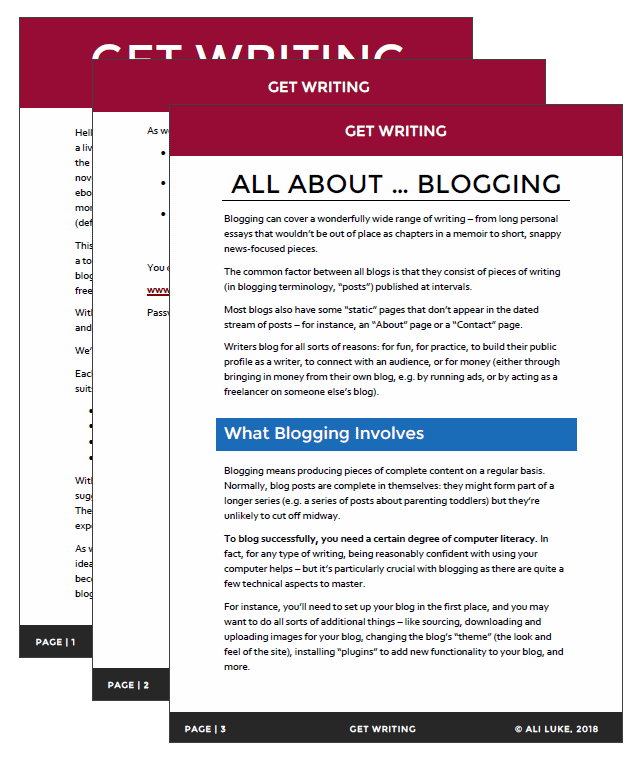Easier, Better Writing: Harnessing Inspiration and Motivation

This post was first published in June 2015 and updated in May 2022.
Inspiration.
Motivation.
What do those words mean to you?
Some writers would have you believe you can’t write anything without them.
Other writers think they’re unnecessary: you just sit down and get on with the task at hand, regardless of how unenthused you feel.
Personally, I think the truth is somewhere in the middle.
Inspiration and motivation matter. They make your writing better. On your best days, they make writing almost effortless – and irresistible.
However, sitting around until the muse descends and the stars align could mean a very long wait.
In a moment, I want to get into practical ways you can harness inspiration and motivation – but before that, let’s clarify those terms.
“Inspiration” and “motivation” sometimes get used almost interchangeably – particularly in the context of “inspirational quotes” or “motivational quotes”.
In a writer’s life, though, they’re two different forces with different roles to play.
Inspiration is about ideas. You might feel inspired by a line of poetry or a blog post or an article in the newspaper: it sparks off an idea for a short story or blog post or article.
Motivation is about drive. It’s the urge to sit down and write, or to carry on writing when you’re halfway through the story, chapter, or blog post you want to finish.
Inspiration can happen in a moment: motivation’s something that lasts longer.
Of course, the two often go hand-in-hand. You have a great idea (which could be for almost anything, from a novel series to a single line of dialogue). You feel enthused about sitting down to write about it. You jump in and then you want to keep going.
Can you write without inspiration and motivation? And will your writing still be as good as it could be without them?
It might still be perfectly adequate. In many cases, “adequate” could well be all you need: perhaps you’re writing something for your job or for a client, and you just need to convey information.
But if you’re writing fiction and you’re not inspired, you’re going to turn out something that’s somehow lacking heart. It might be a competent short story – it’s not going to be a competition-winner.
And if you’re not motivated, you’re going to struggle to ever reach the end of a project, especially if it’s a long one, like a novel.
So what can you do about it? Well, it might be tricky to sit down and decide to feel inspired and motivated … but there’s a lot you can do to hurry the process along.
Getting Inspired
To get inspired, try:
Reading
You might read about writing, or you might read something similar to what you want to write (a novel in the same genre, a blog on the same topic).
Brainstorming
Brainstorming might seem like an odd thing to do when you’re feeling totally uninspired – but set a timer for ten minutes, and sit down with a pen and notebook and start to make notes about your project.
What are you stuck on? What do you need to know? What could happen in your novel? What might work on your blog? Before the ten minutes is up, there’s a very good chance you’ll have hit on a new idea.
Taking a class or course
Back in August 2008, before I started my MA in Creative Writing, I was worried. I’d been blogging for six months and had (I thought) lost the desire to write fiction.
A couple of weeks into the MA, I was raring to go – working first on short stories, then getting up the courage to begin (and, later, finish and publish) the novel I’d been thinking about for years: Lycopolis.
Getting Motivated
Motivation may well naturally follow on from being inspired – but if not, here’s an extremely easy two-step plan to follow:
Step #1: Open up your Google doc / Scrivener project / writing notebook (etc).
Step #2: Spend a couple of minutes jotting down a brief plan for whatever you’re about to write.
More often than not, you’ll find that your initial resistance to writing vanishes almost instantly. It’s a bit like exercise: once you’re over the initial hurdle of getting started, it’s easy to keep going.
If you haven’t written for a while, or haven’t been writing much, you might feel keen to keep going. Hang onto that.
My best, easiest writing comes when I’m working on a project regularly – not necessarily daily, but more than once a week. Once I’m moving, I want to keep it that way.
If you want to keep up your momentum, try:
Putting an “X” on the calendar each day that you write.
Some writers find it incredibly motivating to build an unbroken chain of Xs; others go for a gentler approach and aim for two or three per week (perhaps building up gradually).
Planning writing sessions well in advance.
If you suddenly end up with a busy couple of weeks and no time to write, you’ll lose momentum. Plan ahead – get writing sessions onto your calendar, and mark them off as you complete them.
Keeping a writing journal.
A writing journal is simply a notebook (or electronic equivalent) where you jot down a sentence or two at the end of each session, noting how your writing went. You can record facts (words written, time spent writing), feelings, and even any new ideas that came to you.
Inspiration and motivation are both really important to your writing. They might seem like forces beyond your conscious control … but by trying out the ideas above, you’ll hopefully find that you can generate the conditions that make you much more likely to feel a flash of inspiration or a strong motivation to write.
 Not sure quite what you want to write? Or wondering about trying something new? Get Writing is designed for writers who don’t want to stick to just one thing. It’s a set of four different guides, each covering one area of writing: short stories, novels, blogging, and freelancing.
Not sure quite what you want to write? Or wondering about trying something new? Get Writing is designed for writers who don’t want to stick to just one thing. It’s a set of four different guides, each covering one area of writing: short stories, novels, blogging, and freelancing.
Get Writing is suitable for complete beginners … but it also has “going futher” tips for each area of writing, for writers with more experience. It comes with a bunch of extras, including novel and short story prompts, printable checklists to use as you go through the four guides, and more.
About

I’m Ali Luke, and I live in Leeds in the UK with my husband and two children.
Aliventures is where I help you master the art, craft and business of writing.
Start Here
If you're new, welcome! These posts are good ones to start with:
Can You Call Yourself a “Writer” if You’re Not Currently Writing?
The Three Stages of Editing (and Nine Handy Do-it-Yourself Tips)
My Novels

My contemporary fantasy trilogy is available from Amazon. The books follow on from one another, so read Lycopolis first.
You can buy them all from Amazon, or read them FREE in Kindle Unlimited.


Putting an “X” on the calendar each day that you write – sounds pretty nice. This system is well matched with the way I set goals. I usually put 3 goals: minimal (eg 100 words per day writing), 100% and a maximum ( 10,000 words for example). So,everyday, I always follow goal, even if I do it in small steps.
Hi Ali,
I love your blog! I have learned a lot from your blog. IT has helped me improve as a writer. I think it was a great article too. I think motivation is where most people struggle, and I am one of those people too. I found several helpful tips from this read, and I am really looking forward to adding them to my process. Thanks a lot for sharing such an amazing article. I am sure it will help me in my writing process.